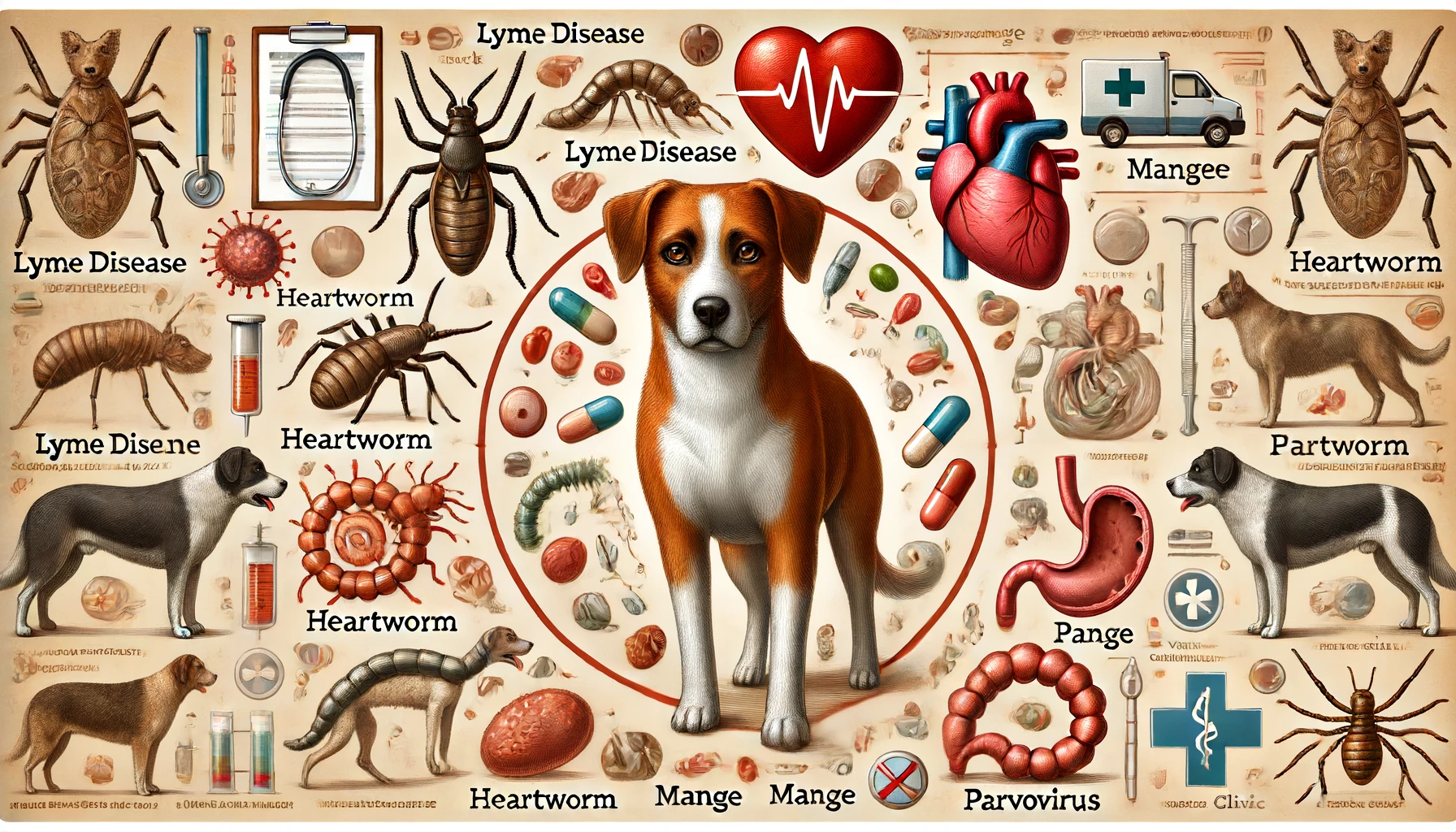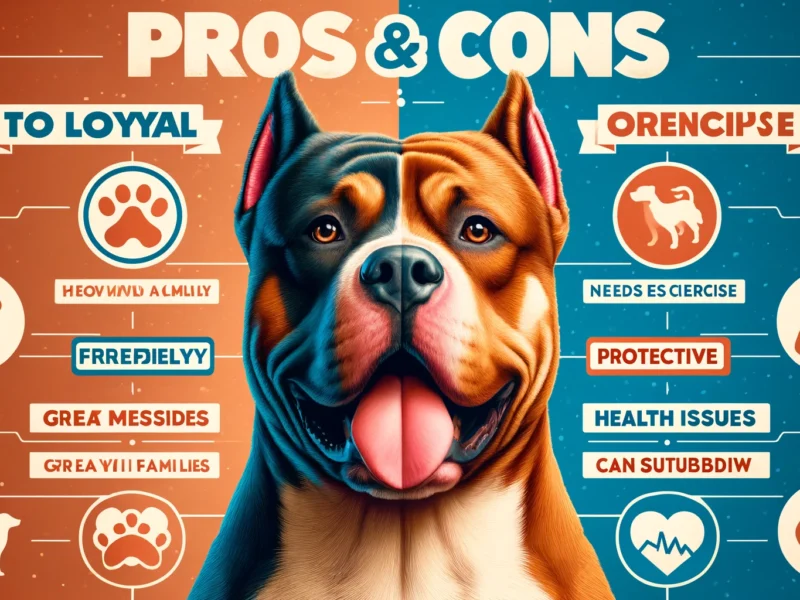Introduction
Rottweiler Puppy: A Loyal and Loving Friend
Rottweiler puppies are strong, smart, and full of energy. They are known for being loyal and protective. These puppies love to play and need lots of exercise. With their black and tan coats, they look very cute and tough at the same time. Rottweilers are quick learners, so training them can be fun and easy. They need a loving home where they can grow and feel safe.
Taking care of a Rottweiler puppy is important. They need good food, regular vet visits, and lots of love. Rottweilers are great family dogs if raised with care and kindness. They enjoy spending time with their owners and are very affectionate. Playing games and going for walks will keep them happy and healthy. Remember, a happy Rottweiler puppy makes a wonderful, lifelong friend.
Fact 1: Hip Dysplasia
Description and Causes
Hip dysplasia is a common genetic condition in Rottweilers that affects the hip joints. It occurs when the hip joint’s ball and socket do not fit together properly, leading to joint instability. This improper fit causes the bones to rub against each other, resulting in pain, inflammation, and eventually arthritis. Several factors can contribute to developing hip dysplasia, including genetics, rapid growth, excessive weight, and improper nutrition.
Symptoms to Watch For
Rottweiler puppies with hip dysplasia may exhibit various symptoms, including:
- Limping or lameness in the hind legs
- Difficulty rising from a sitting or lying position
- Reluctance to run, jump, or climb stairs
- Swelling or pain in the hip area
- Decreased activity or stamina
These symptoms can vary in severity and may appear gradually as the puppy grows.

Prevention and Treatment Options
Preventing hip dysplasia involves several proactive measures:
- Genetic Screening: Before breeding, ensure that both parents are tested for hip dysplasia to reduce the likelihood of passing the condition to their offspring.
- Healthy Weight: Maintain a healthy weight for your puppy to reduce stress on the developing hip joints.
- Proper Nutrition: Provide a balanced diet that supports steady growth and avoids excessive calorie intake.
- Exercise Management: Avoid high-impact activities that strain the hips, especially during the puppy’s growth phase.
If your Rottweiler puppy is diagnosed with hip dysplasia, there are several treatment options available:
- Medications: Non-steroidal anti-inflammatory drugs (NSAIDs) can help manage pain and inflammation.
- Physical Therapy: Exercises and therapies can improve joint function and muscle strength.
- Weight Management: Maintaining a healthy weight can alleviate pressure on the joints.
Surgery: In severe cases, surgical options such as hip replacement or femoral head osteotomy (FHO) may be necessary to provide long-term relief.
Fact 3: Heart Issues
Common Heart Problems in Rottweilers
Rottweilers are prone to several heart conditions affecting their health and longevity. Some of the most common heart problems in this breed include:
- Dilated Cardiomyopathy (DCM): This condition involves the enlargement and weakening of the heart muscle, leading to decreased heart function.
- Subvalvular Aortic Stenosis (SAS): A congenital heart defect that narrows the area below the aortic valve, causing the heart to work harder to pump blood.
- Congenital Heart Defects: Rottweilers may be born with various heart defects that affect the structure and function of the heart.
Symptoms and Diagnosis
Heart issues in Rottweilers can present a range of symptoms, which may include:
- Coughing or difficulty breathing
- Fatigue and weakness
- Fainting or collapse
- Reduced tolerance for exercise
- Swelling in the abdomen (due to fluid buildup)
Rapid or irregular heartbeat

Diagnosis of heart problems typically involves several steps:
- Physical Examination: The veterinarian will listen to the heart and lungs with a stethoscope for abnormal sounds.
- Chest X-rays can reveal the size and shape of the heart and any fluid accumulation in the lungs.
- Electrocardiogram (ECG): This test measures the heart’s electrical activity and can detect irregular heart rhythms.
- Echocardiogram: An ultrasound of the heart that provides detailed images of the heart’s structure and function.
- Blood Tests: Certain biomarkers in the blood can indicate heart disease.
Treatment and Management
Managing heart issues in Rottweilers involves a combination of medical treatment and lifestyle adjustments:
- Medications: Depending on the specific heart condition, medications such as ACE inhibitors, beta-blockers, diuretics, and antiarrhythmic drugs may be prescribed to manage symptoms and improve heart function.
- Diet: A heart-healthy diet low in sodium can help reduce fluid retention and decrease the workload on the heart.
- Exercise: Controlled and moderate exercise can help maintain overall health without overexerting the heart.
- Regular Monitoring: Frequent veterinary check-ups and monitoring are essential to track the progression of the heart condition and adjust treatment as needed.
- Surgery: In some cases, surgical intervention may be necessary to correct congenital defects or other structural issues.
Fact 4: Obesity
Risks Associated with Obesity in Puppies
Obesity in Rottweiler puppies can lead to numerous health problems in the short and long term. Some of the primary risks associated with obesity include:
- Joint Problems: Excess weight stresses growing joints, exacerbating conditions like hip dysplasia and leading to arthritis.
- Heart Disease: Obesity can increase the risk of developing heart conditions due to the added strain on the cardiovascular system.
- Diabetes: Overweight puppies are more susceptible to developing insulin resistance and diabetes.
- Respiratory Issues: Excess fat can interfere with normal lung function, making breathing more difficult.
- Decreased Lifespan: Obesity can significantly reduce a dog’s life expectancy due to the compounded health issues it causes.
- Reduced Mobility: Obese puppies may experience reduced mobility and energy levels, affecting their overall quality of life.
How to Maintain a Healthy Weight
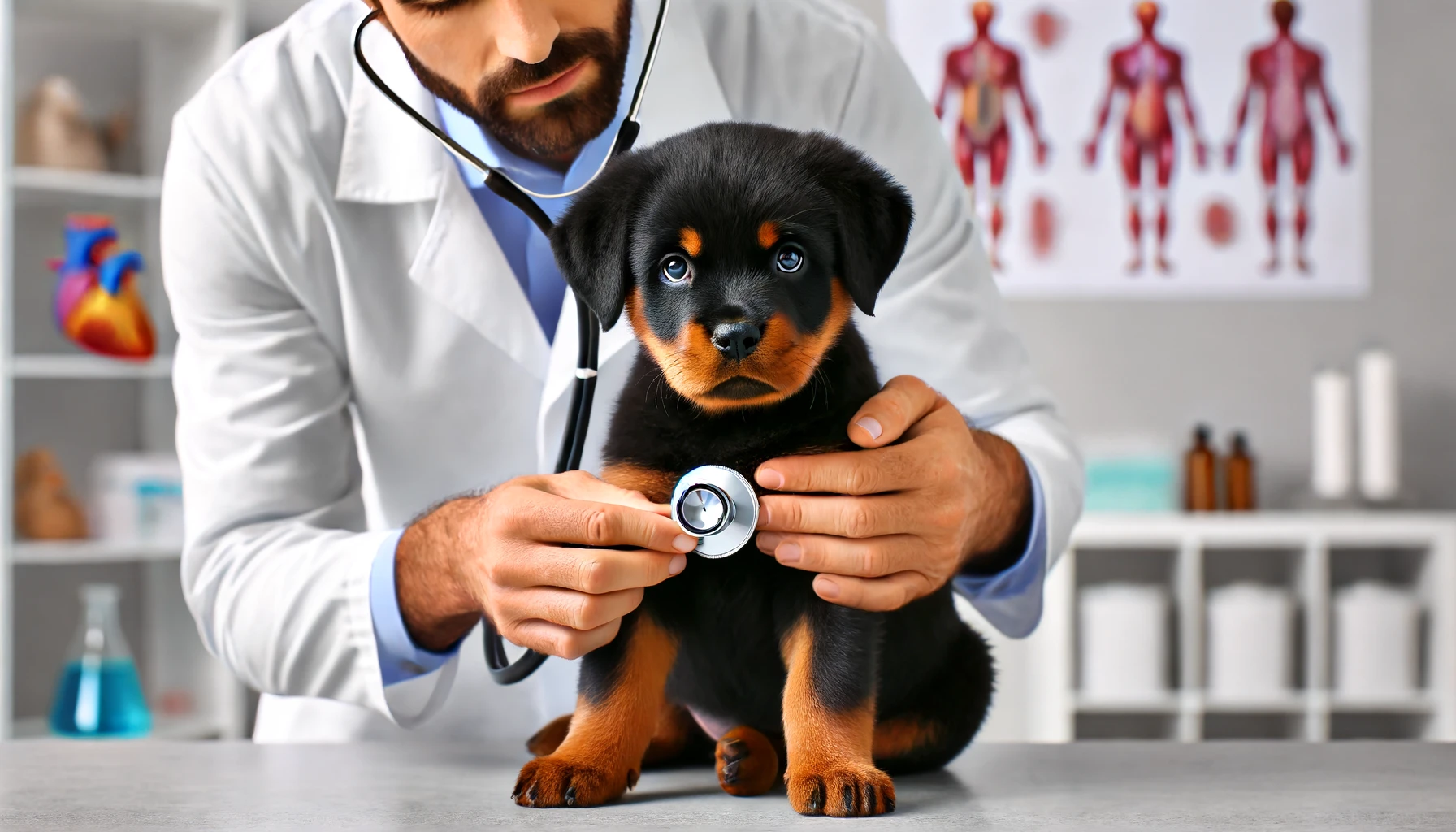
Maintaining a healthy weight for your Rottweiler puppy involves a combination of proper nutrition, regular exercise, and routine health monitoring. Here are some tips:
- Regular Weigh-Ins: Regularly monitor your puppy’s weight and body condition to ensure they stay within a healthy range.
- Portion Control: Feed your puppy the appropriate portion sizes based on age, weight, and activity level. Avoid overfeeding and giving excessive treats.
- Quality Food: Choose a high-quality dog food nutritionally balanced for growth and development.
- Avoid Table Scraps: Human food can be high in calories and may not provide the necessary nutrients for your puppy.
Diet and Exercise Recommendations
Diet:
- Balanced Nutrition: Ensure your puppy’s diet includes the right balance of proteins, fats, carbohydrates, vitamins, and minerals. Consult your veterinarian for recommendations on the best diet for your Rottweiler puppy.
- Controlled Portions: Follow the feeding guidelines on your dog food packaging and adjust based on your puppy’s growth and activity level.
- Healthy Treats: Offer low-calorie, nutritious treats like carrot sticks or apple slices in moderation.
- Consistent Feeding Schedule: Establish a regular feeding schedule to help regulate your puppy’s metabolism and prevent overeating.
Exercise:
- Daily Activity: Provide regular, moderate exercise to keep your puppy active and healthy. This can include walks, playtime, and interactive toys.
- Avoid Overexertion: While exercise is important, avoid high-impact activities that strain your puppy’s developing joints. Opt for gentle activities that are appropriate for their age and size.
- Mental Stimulation: Incorporate stimulation through training sessions and puzzle toys to keep your puppy engaged and mentally fit.
Fact 5: Allergies
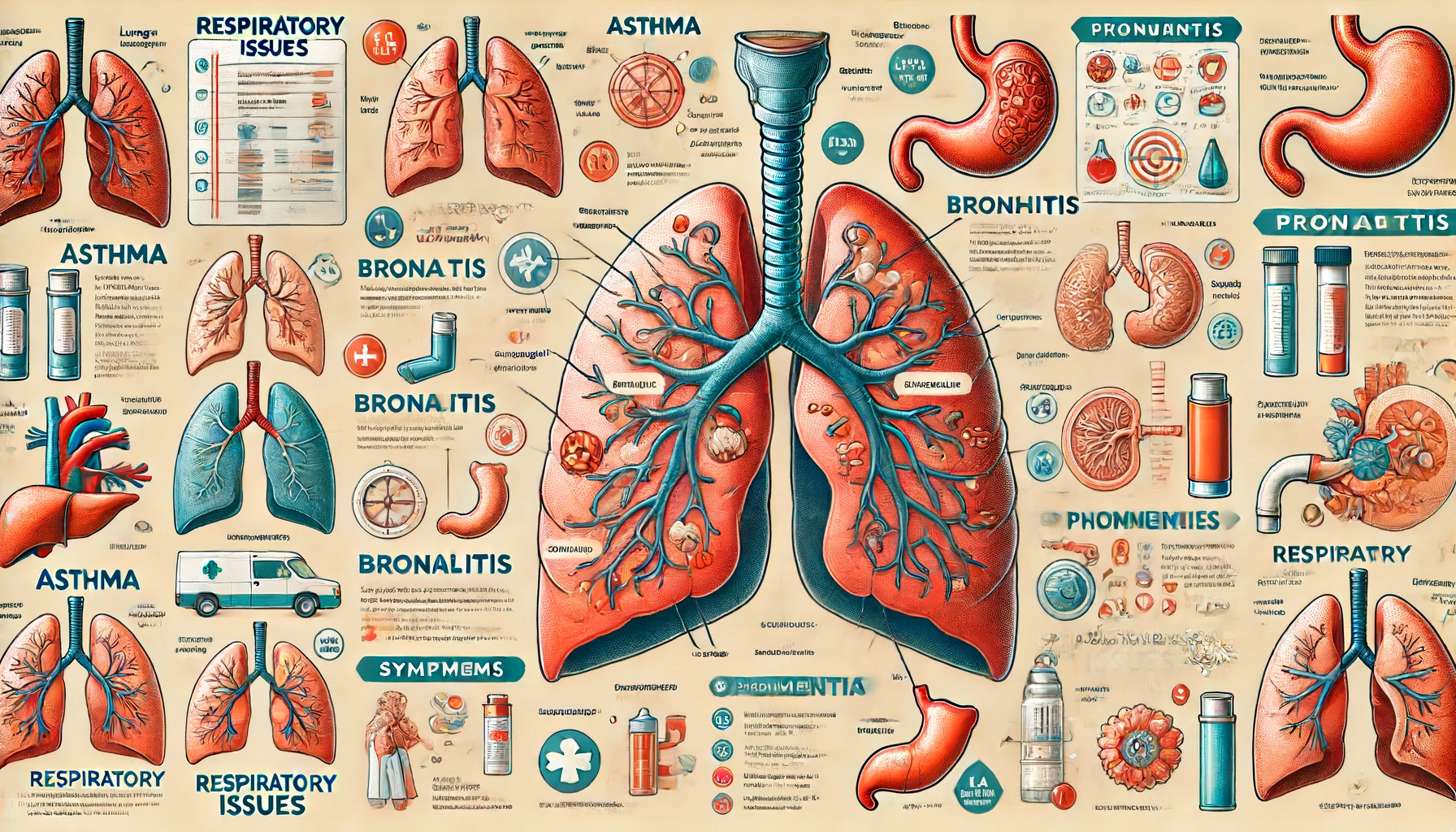
Common Allergens for Rottweilers
Like many other dog breeds, Rottweilers can be susceptible to various allergens. These allergens can be categorized into three main types:
- Environmental Allergens: Pollen, dust mites, mold spores, and grasses are common environmental triggers.
Food Allergens: Certain ingredients in dog food, such as beef, chicken, dairy, wheat, and soy, can cause allergic reactions.
Contact Allergens: Chemicals in household cleaning products, shampoos, flea collars, and certain fabrics can lead to skin allergies.
Symptoms of Allergies
Allergies in Rottweilers can manifest in different ways. Some common symptoms to watch for include:
- Skin Issues: Itching, redness, rashes, hot spots, and hair loss are typical signs of skin allergies. Your Rottweiler might frequently scratch, lick, or chew affected areas.
Ear Problems: Allergies can cause recurrent ear infections, leading to symptoms like redness, odor, discharge, and frequent head shaking.
Digestive Issues: Food allergies can result in gastrointestinal problems such as vomiting, diarrhea, and chronic gas.
Respiratory Symptoms: Although less common, some dogs may exhibit sneezing, coughing, and nasal discharge due to environmental allergens.
Treatment and Prevention Strategies
Managing allergies in Rottweilers involves identifying the allergens, minimizing exposure, and providing appropriate treatment. Here are some strategies:
Environmental Allergies:
- Minimize Exposure: Keep your home clean and dust-free. Use air purifiers to reduce airborne allergens. Wipe your dog’s paws and coat after outdoor activities to remove pollen and other irritants.
- Bathing: Regularly bathe your Rottweiler with hypoallergenic shampoos to soothe the skin and remove allergens. Consult your vet for recommended products.
Food Allergies:
- Elimination Diet: Work with your veterinarian to identify food allergens by putting your dog on an elimination diet. Gradually reintroduce ingredients to determine the cause of the allergy.
- Specialized Diets: Once the allergen is identified, switch to a hypoallergenic or limited-ingredient diet to avoid triggering allergic reactions.
Contact Allergies:
- Avoidance: Identify and eliminate the source of contact allergens. Use pet-safe cleaning products and hypoallergenic bedding materials.
- Topical Treatments: Apply medicated creams or sprays as your veterinarian prescribes to alleviate skin irritation and inflammation.
General Treatment Options:
- Medications: Antihistamines, corticosteroids, and immune-modulating drugs can help manage allergic reactions and relieve symptoms.
- Supplements: Omega-3 fatty acid supplements can improve skin health and reduce inflammation.
- Immunotherapy: Allergy shots or oral drops, also known as desensitization therapy, can gradually reduce your dog’s sensitivity to specific allergens.
Prevention Strategies:
- Regular Vet Visits: Schedule regular check-ups with your veterinarian to monitor your Rottweiler’s health and promptly address any emerging allergy issues.
- Balanced Diet: Provide a balanced diet that supports a healthy immune system, potentially reducing the severity of allergic reactions.
- Clean Environment: Maintain a clean living environment to minimize exposure to potential allergens.
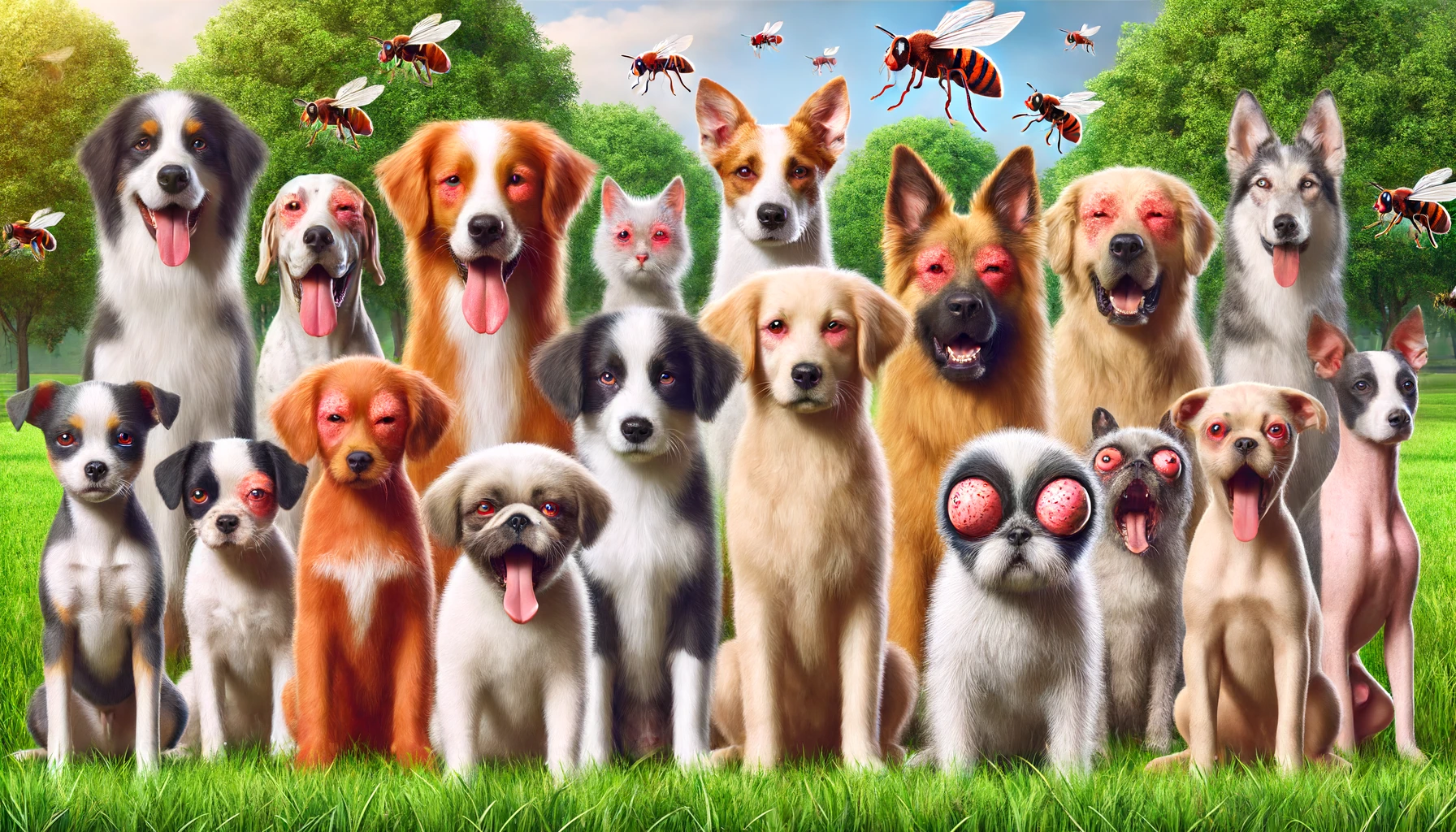
Fact 6: Hypothyroidism
Understanding Hypothyroidism
Hypothyroidism is a condition where the thyroid gland, located in the neck, does not produce enough thyroid hormones. These hormones are crucial for regulating metabolism and maintaining overall health. Hypothyroidism is relatively common in dogs and can affect Rottweiler puppies, though it is more frequently diagnosed in adult dogs. The condition can lead to a variety of health issues if left untreated.
Symptoms in Rottweiler Puppies
While hypothyroidism is more commonly diagnosed in adult dogs, it can occasionally present in younger dogs. Symptoms to watch for in Rottweiler puppies include:
- Lethargy: A noticeable decrease in energy levels and reluctance to engage in play or exercise.
- Weight Gain: Unexplained weight gain despite a normal diet and exercise routine.
- Hair Loss: Thinning coat, especially around the tail and back, and slow hair regrowth.
- Skin Issues: Dry, flaky skin and recurrent skin infections.
- Cold Intolerance: Increased sensitivity to cold temperatures.
- Behavioral Changes: Depression, anxiety, or other mood changes.
- Poor Growth: Stunted growth and delayed development in severe cases.
Diagnosis and Treatment Options
Diagnosing hypothyroidism involves several steps:
- Physical Examination: The veterinarian will conduct a thorough physical examination and review the puppy’s medical history.
- Blood Tests: Blood tests are crucial to measure the levels of thyroid hormones (T4 and TSH) in the blood. Low levels of T4 and elevated TSH levels typically indicate hypothyroidism.
- Additional Tests: In some cases, further tests, such as a thyroid antibody test, may be required to confirm the diagnosis and determine if an autoimmune condition is causing the hypothyroidism.
Treatment Options:
- Thyroid Hormone Replacement: The primary treatment for hypothyroidism is the administration of synthetic thyroid hormone (levothyroxine). This medication helps to restore normal hormone levels and alleviate symptoms. It is usually given orally, once or twice daily.
- Regular Monitoring: Regular veterinary visits are essential to monitor the puppy’s response to treatment. Blood tests will be conducted periodically to ensure the medication dosage is correct and adjust it if necessary.
- Diet and Lifestyle: While medication is the primary treatment, maintaining a balanced diet and regular exercise can support overall health and well-being.
Fact 7: Gastric Dilatation-Volvulus (Bloat)
What is Bloat?
Gastric Dilatation-Volvulus (GDV), commonly known as bloat, is a serious and life-threatening condition affecting dogs’ stomachs, including Rottweilers. Bloat occurs when the stomach fills with gas, food, or fluid, causing it to expand. The stomach can then rotate (volvulus), twisting around its axis. This rotation traps the contents and cuts off the blood supply to the stomach and other vital organs, leading to shock and, if not treated promptly death.
Risk Factors for Rottweilers
Rottweilers, like other large and deep-chested breeds, are at a higher risk for developing bloat. Some common risk factors include:
- Large Meals: Eating one or two large meals daily instead of smaller, more frequent meals.
- Rapid Eating: Consuming food or water too quickly.
- Exercise After Meals: Vigorous exercise or physical activity soon after eating.
- Stress: Anxiety and stress can contribute to the development of bloat.
- Genetics: A family history of bloat can increase the likelihood of occurrence.
- Age: Older dogs are at a higher risk.
- Body Conformation: Deep and narrow chest conformation increases the risk.
Prevention and Emergency Care
Prevention:
- Frequent, Smaller Meals: Feed your Rottweiler smaller meals multiple times a day instead of one or two large meals.
- Slow Feeding: Use slow-feeder bowls or food-dispensing toys to slow your dog’s eating.
- Limit Water Intake During Meals: Prevent your dog from drinking large amounts of water immediately before or after meals.
- Avoid Vigorous Exercise Post-Meals: Do not allow your dog to engage in strenuous activities right after eating. Wait at least an hour before any intense exercise.
- Reduce Stress: Minimize stressful situations and provide a calm environment, especially around feeding times.
- Preventative Surgery: In high-risk dogs, a preventative surgical procedure called gastropexy can be performed. This surgery involves tacking the stomach to the abdominal wall to prevent it from twisting.
Emergency Care:
Bloat is a medical emergency, and immediate veterinary attention is crucial. If you suspect your Rottweiler is experiencing bloat, look for the following symptoms and act quickly:
Symptoms:
- Distended or swollen abdomen
- Unsuccessful attempts to vomit
- Excessive drooling
- Restlessness or anxiety
- Rapid or shallow breathing
- Weakness or collapse
Immediate Actions:
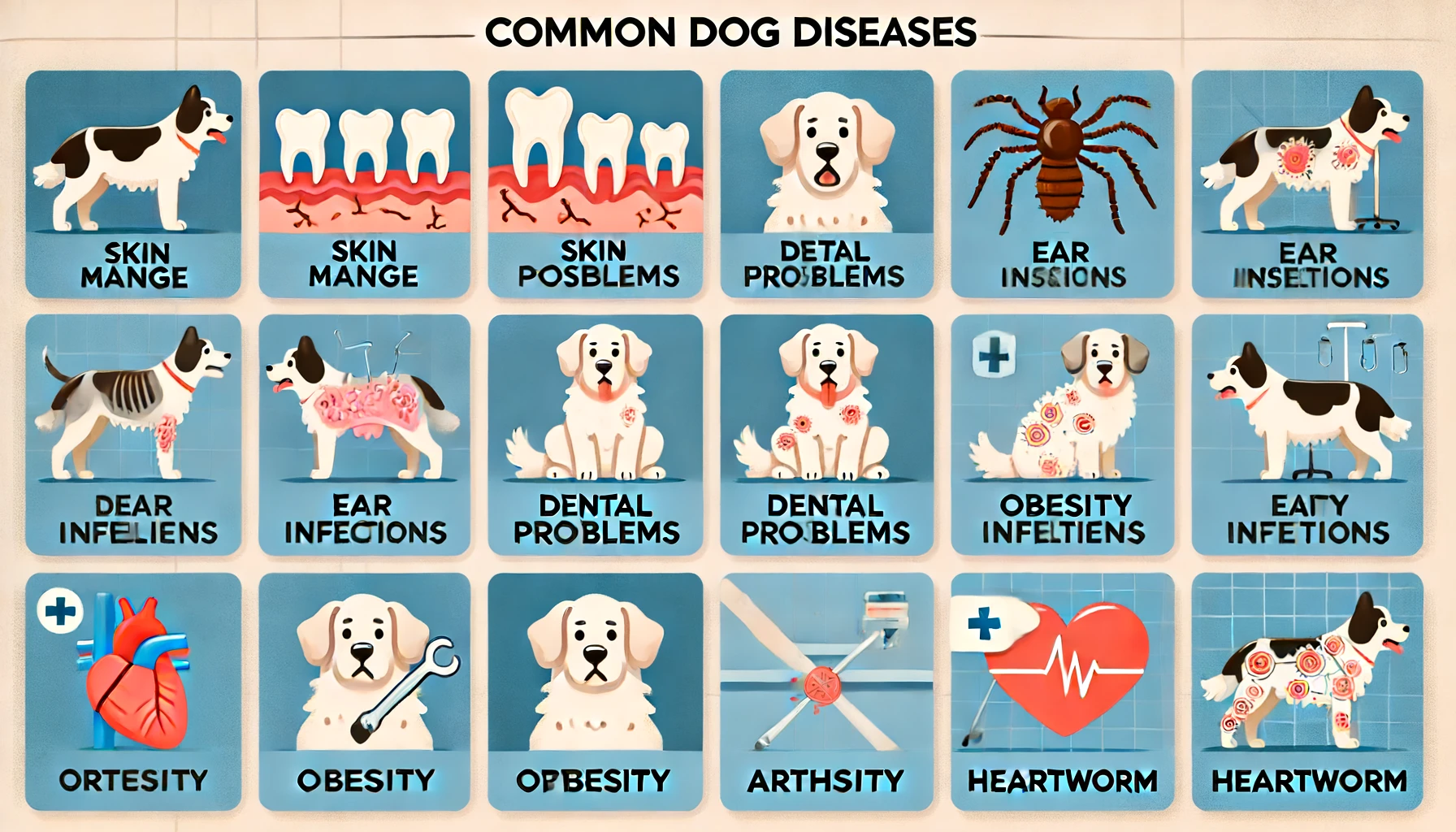
Do not attempt to treat bloat at home.
Transport your dog to the nearest veterinary clinic or emergency animal hospital as quickly as possible.
Veterinary Treatment:
- Stabilization: Initial treatment focuses on stabilizing the dog with intravenous fluids and medications to manage shock and pain.
- Decompression: The veterinarian may insert a tube or needle into the stomach to relieve pressure and remove gas.
- Surgery: Emergency surgery is often required to untwist the stomach and assess any damage to the stomach or other organs. The surgeon may also perform a gastropexy to prevent recurrence.
Fact 8: Eye Problems
Common Eye Issues in Rottweilers
Rottweilers can be prone to several eye conditions affecting their vision and overall health. Some of the common eye issues in Rottweilers include:
- Cataracts: A condition where the eye’s lens becomes cloudy, leading to impaired vision and potentially blindness if left untreated.
- Progressive Retinal Atrophy (PRA): A genetic disorder that causes the gradual degeneration of the retina, leading to progressive vision loss and eventual blindness.
- Entropion: A condition where the eyelids roll inward, causing the eyelashes to irritate the eye’s surface, leading to discomfort and potential damage to the cornea.
- Ectropion: The opposite of entropion, where the eyelids roll outward, exposing the inner eyelid and leading to dryness and irritation.
- Cherry Eye: A prolapse of the gland of the third eyelid, resulting in a red, swollen mass in the corner of the eye.
- Conjunctivitis: Inflammation of the conjunctiva (the membrane lining the eyelids), often caused by infections, allergies, or irritants.
Symptoms and Early Detection
Early detection of eye problems is crucial for effective treatment and maintaining your Rottweiler’s eye health. Watch for the following symptoms:
- Cloudiness or Opacity: Cloudy or opaque appearance in one or both eyes may indicate cataracts or other lens issues.
- Redness: Red or inflamed eyes can indicate conjunctivitis or other inflammatory conditions.
- Discharge: Unusual discharge from the eyes, which may be clear, yellow, or green, indicating an infection or irritation.
- Squinting or Blinking: Frequent squinting, blinking, or pawing at the eyes, suggesting discomfort or pain.
- Visible Mass: A red or swollen mass in the corner of the eye, indicative of a cherry eye.
- Vision Changes: Difficulty seeing in low light, bumping into objects, or general changes in vision-related behavior.
Treatment and Care
Treatment Options:
- Medications: Eye infections and inflammations are often treated with antibiotic or anti-inflammatory eye drops or ointments. Allergies may also be managed with antihistamines.
- Surgery: Some conditions, such as cataracts, entropion, ectropion, and cherry eye, may require surgical intervention to correct the issue and prevent further damage.
- Dietary Supplements: Supplements containing omega-3 fatty acids and antioxidants can support overall eye health and may slow the progression of certain conditions like PRA.
Care Strategies:
- Regular Eye Check-ups: Schedule veterinary eye examinations to monitor your Rottweiler’s eye health and detect any issues early.
- Cleanliness: Keep the area around your dog’s eyes clean. Gently wipe away any discharge with a damp cloth to prevent irritation and infection.
- Protective Measures: If your Rottweiler is prone to eye problems, consider using protective eye gear during activities that might expose them to dust, debris, or other irritants.
- Healthy Diet: Provide a balanced diet rich in essential nutrients to support overall health, including eye health.
- Monitor for Changes: Keep an eye on any changes in your dog’s behavior or appearance related to their vision and seek veterinary advice promptly if you notice any concerning symptoms.
Final Take for Rottweiler Puppy
Rottweiler puppies are amazing pets. They are loyal, smart, and love to play. With proper care, they grow into strong and loving dogs. Training them early helps them become well-behaved adults. A happy Rottweiler puppy will bring joy to any home.
Taking care of a Rottweiler puppy requires effort. They need good food, regular vet check-ups, and lots of exercise. Playing with them daily keeps them healthy and happy. Socializing them with other dogs and people is also important. With love and care, they will thrive.
In the end, Rottweiler puppies are worth the effort. They make great companions and protectors. Their loyalty and affection are unmatched. With proper training and care, they become wonderful family members. A Rottweiler puppy will be a friend for life.
FAQs About Rottweiler Puppies
Q: How much exercise does a Rottweiler puppy need?
Rottweiler puppies need plenty of exercise to stay healthy. Aim for at least 30-60 minutes of activity each day. This can include walks, playtime, and training sessions. Regular exercise helps them grow strong and prevents boredom.
Q: What should I feed my Rottweiler puppy?
Feed your Rottweiler puppy a high-quality food designed for large breeds. This ensures they get the right nutrients for healthy growth. Follow the feeding guidelines on the package, and consult your vet for specific advice.
Q: How can I train my Rottweiler puppy?
Start training your Rottweiler puppy early. Use positive reinforcement, like treats and praise, to teach basic commands such as sit, stay, and come. Consistency and patience are key. Enrolling in a puppy training class can also be helpful.
Q: Are Rottweiler puppies good with children?
If properly socialized and trained, Rottweiler puppies can be great with children. Always supervise interactions between puppies and young children to ensure safety. Teach children how to gently approach and handle the puppy.
Q: How often should I take my Rottweiler puppy to the vet?
Take your Rottweiler puppy to the vet for regular check-ups, especially during their first year. They need vaccinations, deworming, and health screenings. Regular vet visits help ensure your puppy stays healthy and catches any issues early.
Q: What are common health issues in Rottweiler puppies?
Common health issues in Rottweiler puppies include hip dysplasia, heart problems, and allergies. Regular vet visits and a healthy lifestyle can help manage and prevent these conditions. Be aware of changes in your puppy’s behavior or health, and consult your vet if you notice anything unusual.
Q: How do I socialize my Rottweiler puppy?
Socialize your Rottweiler puppy by exposing them to different people, places, and animals. Start early and make the experiences positive. Puppy classes, playdates, and regular outings can help your puppy become well-adjusted and confident.
